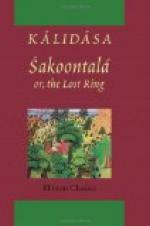These descriptions of the successful representation of the [S’]akoontala in Travancore justified me in expressing a hope that, as Kalidasa has been called the Shakespeare of India, so the most renowned of his three dramatic works might, with a few manifestly necessary modifications, be some day represented, with equal success, before English-speaking audiences in other parts of the world and especially here in England. This hope has been realized, and quite recently my translation has been successfully acted by amateur actors before a London audience.
I venture, therefore, to add the expression of a further hope that with the daily growth of interest in Oriental literature, and now that the [S’]akoontala forms one of Sir John Lubbock’s literary series, it may be more extensively read by the Rulers of India in all parts of the Empire. Those who study it attentively cannot fail to become better acquainted with the customs and habits of thought, past and present, of the people committed to their sway.
And it cannot be too often repeated that our duty towards our great Dependency requires us to do something more than merely rule justly. We may impart high education, we may make good laws, we may administer impartial justice, we may make roads, lay down railroads and telegraphs, stimulate trade, accomplish amazing engineering feats—like that lately achieved at Periyar—increase the wealth and develop the resources of our vast Eastern territories; but unless we seek to understand the inhabitants, unless we think it worth while to study their ancient literatures, their religious ideas, and time-honoured institutions, unless we find in them something to admire and respect, we can never expect any reciprocity of esteem and respect on their part—we can never look forward to a time when the present partition-wall, which obstructs the free Interchange of social relations between European and Asiatic races, will be entirely removed.
Monier Monier-Williams, December, 1898.
INTRODUCTION
About a century has elapsed since the great English Orientalist, Sir William Jones, astonished the learned world by the discovery of a Sanskrit Dramatic Literature. He has himself given us the history of this discovery. It appears that, on his arrival in Bengal, he was very solicitous to procure access to certain books called Nataks, of which he had read in one of the ‘Lettres Edifiantes et Curieuses’ written by the Jesuit Missionaries of China. But, although he sought information by consulting both Brahmans and Europeans, he was wholly unable for some time to satisfy his curiosity as to the nature of these books. It was reported to him that they were not histories, as he had hoped, but that they abounded with fables, and consisted of conversations in prose and verse held before ancient Rajas, in their public assemblies. Others, again, asserted that they were discourses on




